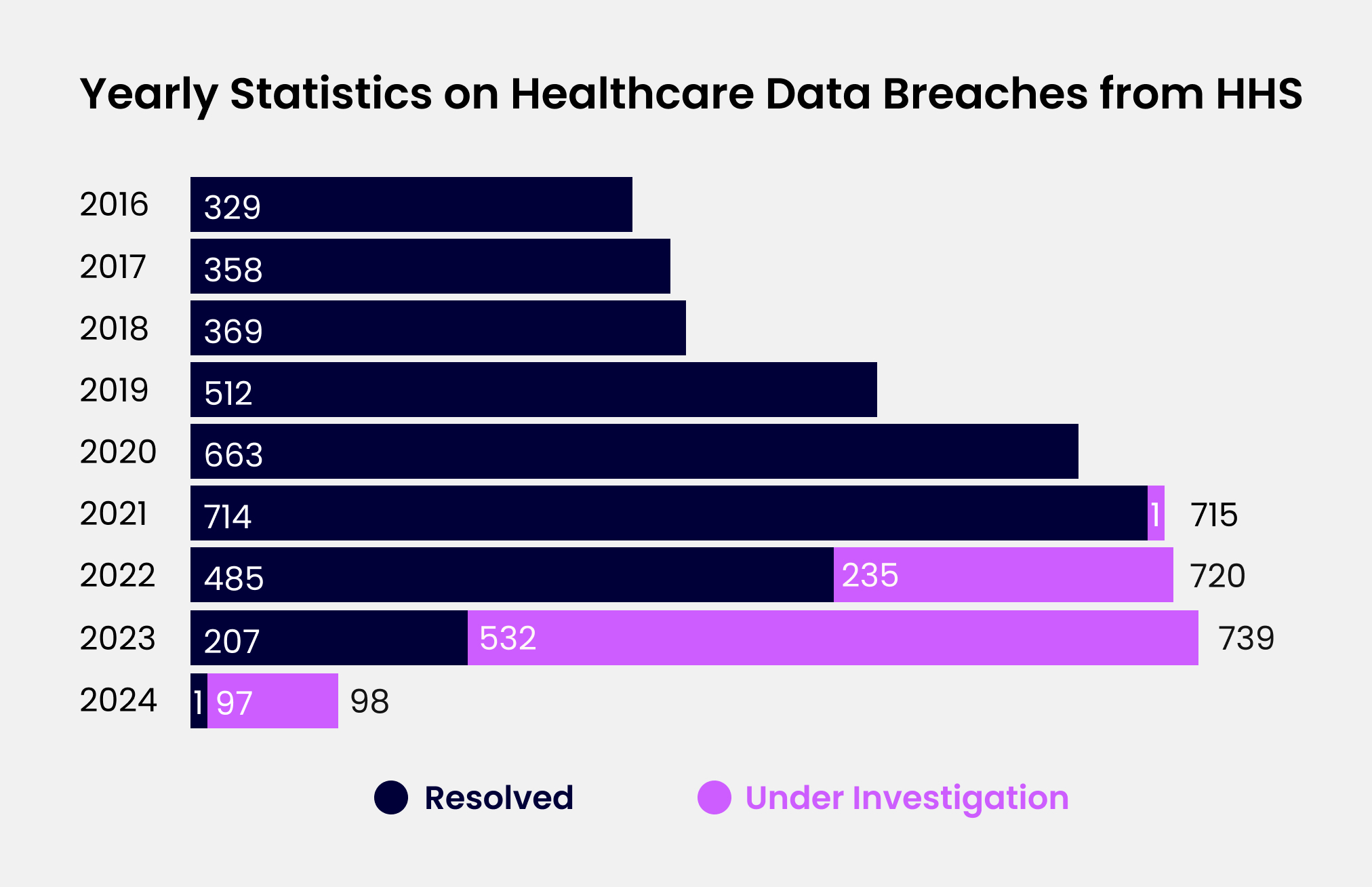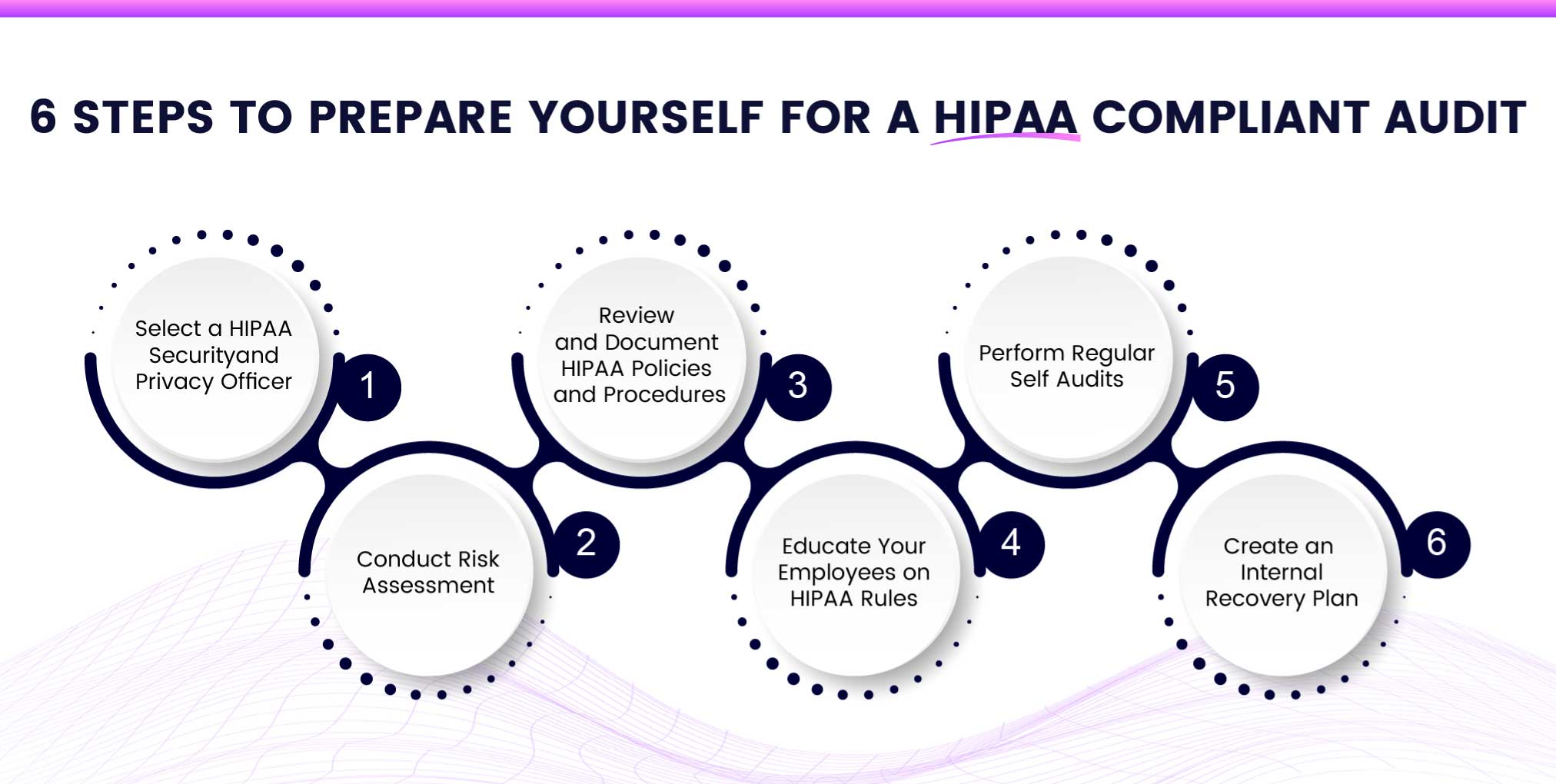

August 2, 2024
If you are a healthcare services provider or running a healthcare practice, the least you want in the morning is an email from the Office of Civil Rights (OCR). Are you unaware of OCR? Let us clarify what OCR is and its core goal.
OCR is responsible for ensuring that medical practices or business associates in the US comply with HIPAA to protect sensitive patient medical information. It is due to an increasing number of healthcare data breaches.

To ensure HIPAA compliance, they select several healthcare organizations for a HIPAA audit to check whether they follow the privacy and security rules. If you deal with healthcare data and are not HIPAA-compliant, you will be in big trouble if, for some reason, OCR selects you.
Startups and enterprises need not panic, as we are here to help you know everything about the HIPAA compliance audit and how you can prepare your organization for it to avoid any penalties.
A HIPAA compliance audit is a way of checking how covered entities and business associates handle and secure protected health information. The goal is to evaluate whether these organizations are following the HIPAA best practices to secure patient information or not.
Many of you might be wondering what things are considered in this audit. To clear you all, during this audit, a comprehensive review of policies, procedures, employee training, and other security measures is carried out to ensure everything is in place to prevent data breaches.
This HIPAA audit is conducted every year by the US Health and Human Services (HHS) Office for Civil Rights (OCR) to resolve healthcare data security challenges.
The OCR can conduct a HIPAA audit of your medical practice at any time. There is no fixed schedule. That’s why it’s important to always stay ready for a sudden audit. As for why the OCR might call for a HIPAA IT audit, the usual reasons are a data breach report or a complaint. Let’s take some examples of the reasons that can trigger HIPAA compliance audits.

Healthcare organizations that fail to comply with HIPAA rules and regulations have to bear huge financial losses. The loss isn’t confined to finances; non-compliance can also damage the reputation of your medical practice and may lead you to jail. The OCR decides and categorizes these penalties in tiers depending on the severity of the non-compliance.
There have been numerous instances of HIPAA violations that have resulted in significant penalties. One of the major reasons is that 36% of healthcare organizations don’t understand HIPAA regulations. Here are some real-world examples where healthcare providers faced penalties for failing to comply with HIPAA standards.
One of the biggest healthcare data breach incidents happened with Anthem, Inc. It is one of the largest health insurance companies in the United States. In this data breach, the electronic patient records of nearly 79 million people were compromised in 2015.
Anthem paid a staggering $16 million fine for security breaches to the OCR. It was also fined for a lack of a variety of other security measures, including risk analysis, access controls, and poor system monitoring procedures since February 2014.
Another real-world example of HIPAA non-compliance is Cottage Health. It is a network of hospitals and healthcare facilities serving the Central Coast of California.
It faced multiple data breach incidents that exposed the ePHI of 62,500 patients. The first breach happened in 2013 due to their negligence in securing a critical internal server. The second incident occurred in 2015 when the IT team accidentally removed server protections while fixing a problem. The OCR settled Cottage Health HIPAA violation case for a fine of $3 Million.
The best part about the HIPAA audit is that your medical practice doesn’t have to pay for it; the HHS covers all costs. However, if you decide to hire a healthcare IT consulting company to run an internal audit to ensure HIPAA compliance and avoid penalties, it can cost you around $7,000 to $12,000.
You must keep in mind that the cost may vary depending on the scope of the audit and the region of the healthcare consultancy provider.
The duration of a HIPAA compliance audit varies based on the scope and extent of the breach. It can take anywhere from 3 weeks to several months to complete. Once your organization is notified of an audit, you have just 10 days to submit your response.
The rest of the process is handled by the auditor. They will finalize an audit report for each entity and share the final report with the organization.

The best way to avoid legal and financial penalties is always to be ready for a HIPAA compliance audit. It is necessary to stay proactive and check mark the following best practices to prepare your medical practice for the HIPAA audit in 2024:
Healthcare providers must appoint a HIPAA privacy and security offer in order to protect patient medical records. Most organizations prefer an external officer, while some with limited resources assign this role to an internal person who is well-versed in HIPAA rules and regulations. The key responsibilities of this officer include:
The next step is to perform a risk assessment to identify security loopholes within your organization. Most organizations overlook the proper documentation of risk assessment. You must document everything to showcase the OCR in case of a surprise call. Here are some factors to consider when conducting a risk assessment:
These steps will ensure that you’re ready for HIPAA audits and effectively secure sensitive information.
If you think that just having policies in place is enough, then you may be wrong. It is important to continuously update procedures and policies to ensure they remain efficient and effective.
You must consider reviewing your policies as living documents that evolve with your business. Continuous reviews help OCR understand how well these guidelines are implemented and highlight areas for improvement.
This proactive approach promotes a culture of continuous improvement and demonstrates your organization’s commitment to compliance, reducing the likelihood of penalties during audits.
It’s essential to train your employees on HIPAA regulations. They should know the importance of complying with security and privacy rules and what the outcomes are if they cannot meet evolving standards. But why is it so?
It is because effective training ensures that everyone in your organization stays current with the latest legal updates and best practices for protecting protected health information (PHI). For this, you must provide thorough training materials to all staff members. This training should include essential topics like patient rights and how to handle sensitive information efficiently.
Conducting regular internal audits is essential for any healthcare provider or business associate. Internal audits for HIPAA compliance assist healthcare organizations in identifying gaps, mitigating risks, and ensuring full adherence to HIPAA regulations.
Once done, the findings should be compiled into a comprehensive report that highlights compliance areas, non-compliance issues, and recommendations for improvement.
The last step is to have an internal recovery plan. While you have all security measures in place, you still might face a failure in protecting data from breaches. In such a scenario, it is crucial to have a plan of further steps that you must take to correct the challenge and prevent any unfortunate circumstances.
It involves informing the OCR, the patients, and other stakeholders involved about the data breach. It helps you to deliver high-quality care even in the face of disruptions and shows your commitment to always complying with HIPAA regulations.
Don’t risk ending up like Anthem and Cottage Health. You must ensure full HIPAA compliance to save millions. Xeven Solutions is a healthcare AI development company that offers HIPAA-compliant solutions and services to ensure that your organization can avoid hefty penalties and win the trust of your stakeholders. We not only provide modern solutions but also analyze your existing healthcare IT ecosystem to identify loopholes and make your systems secure. Get in touch today and see how Xeven Solutions can help you achieve HIPAA compliance.
HIPAA audit is a process of evaluating how well covered entities and business associates are complying with the HIPAA rules and regulations. In this process, the selected organizations submit a response (records and documents) to the OCR email within 10 days. The OCR auditors will review the submitted document and send you the findings.
The simple answer is Yes. HIPAA requires audit logs from your healthcare organization. They require it to investigate the activity in your healthcare IT infrastructure where digital patient information is stored.
Audit controls are mechanisms and procedures to record, monitor, and analyze activity in healthcare systems that handle sensitive data, such as electronic protected health information (ePHI). These controls are crucial for ensuring security, compliance, and accountability within an organization.
There’s no specific rule for the number of self-audits. It depends on changes in operations, healthcare technology, or a major incident. However, conducting a HIPAA compliance audit twice a year is important to identify and address privacy and security gaps in order to comply with HIPAA.